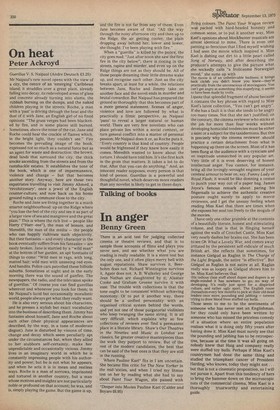Talking of books
in anger
Benny Green
There is an acid test for judging collected cinema or theatre reviews, and that is to sample those accounts of films and plays you never saw, and see whether what you are reading is really readable. It is a stern test but the only one, and it often plays merry hell with august reputations. Shaw survives it, Beerbohm does not. Richard Winnington survives it, Agate does not. A. B. Walkeley and George Jean Nathan are slaughtered by it; Alastair Cooke and Graham Greene survive it with ease. The trouble with collections is that the tone ought to be consistent without achieving monotony. Or to put it another way, there should be a unified personality with an organised critical system behind the words, and yet not one of those purgatorial violinists who keep twanging the same string. It is all very difficult, which explains why so few collections of reviews ever find a permanent place in a literate library. Shaw's Our Theatres in the Nineties and Music in London are classics, far greater creative masterpieces than the work they purport to review. But of the rest of the modern candidates, the best that can be said of the best ones is that they are still in the running.
Where Pauline Kael* fits in I am uncertain. She became film critic for The New Yorker in the mid-'sixties, and when I tried my litmus test on her by reading what she had to say about Paint Your Wagon, she passed with flying colours. The Paint Your Wagon review was packed with hard-headed honesty and common sense, or to put it another way, Miss Kael's opinions about blockbuster musicals are almost identical to mine. There is even one panning so ferocious that I find myself wishing I had seen the movie which inspired it. Miss Kael is dishing out dirt to a little pearl called Song of Norway, and after describing the producer's attempts to give the picture what she wickedly calls "a frolicsome Norwegian mood," she sums up with The movie is of an unbelievable badness; it brings
back cliclis you didn't know you knew—they're practically from the unconscious of moviegoers. /.1:iu can't get angry at something this stupefying; it seems to have been made by trolls.
I quote that splendid fragment of abuse because it contains the key phrase with regard to Miss Kael's latest collection, "You can't get angry". If she has a fault it is that she tends to be angry too many times. Not that she isn't justified; on the contrary, the cinema reviewer who sticks at the job for more than four weeks without developing homicidal tendencies must be either a saint or a subject for the taxidermists. But this is precisely why the cinema reviewer should practice a certain detachment from what is happening up there on the screen. Most of it has been flung at the audience with a cynicism and an ineptitude unmatched in any popular art. Very little of it is even deserving of honest intellectual anger. You cannot, for instance, bring all the lovingly-wrought engines of your cerebral armour to bear on, say, Funny Lady or Royal Flash; it would be like donning a cestus to punch your way out of a paper bag. James Joyce's famous remark about paring his fingernails to achieve the authentic creative posture ought surely to apply to movie reviewers, and I get the uneasy feeling when reading Miss Kael that there are times when she exposes her soul too freely to the moguls of the movies.
I have only one other grumble at the contents of a beautifully literate, honest and stimulating volume, and that is that in flinging herself against the walls of Crotchet Castle, Miss Kael very nearly dashes her brains out. She has been to see Oh What a Lovely War, and comes away irritated by the persistent self-ridicule of much British art. She reflects that sometimes, for instance Gielgud as Raglan in The Charge of the Light Brigade, the satire "is effective". But Gielgud as Raglan is not satire at all. Raglan really was as loopey as Gielgud shows him to be. Miss Kael believes that this tedious class stuff about dupes and dupers is so single-minded it has nowhere to go. no way of developing. It's really just sport for a dispirited culture, and rather ugly sport. The English rouse themselves every few months to pick at their old dead leaders once more, pounding and jabbing -toreros trying to draw blood from stuffed toy bulls.
Those seem to me to be the sentiments of someone who has never met an Englishman, for they could only have been written by someone who has missed the priceless comedy of a situation where an entire population realises what it is doing only fifty years after having done it. Miss Kael must surely see that the pounding and jabbing has to be retrospective, because at the time it was all going on nobody knew that Haig and company really were stuffed toy bulls. Perhaps if Miss Kael's countrymen had done the same thing and studied the triumphant cancer of President .Harding, who knows, today they might not
:but that is not a cinematic proposition, so I will not pursue it. Apart from this tendency of hers to bring the hammer down on the microscopic nuts of the commercial cinema, Miss Kael is a thoroughly trustworthy and entertaining guide.


































 Previous page
Previous page